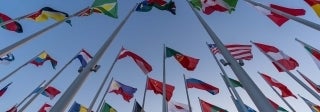
2016 Seminar
The Paris Effect: Journalism, Diplomacy, and Information Controls
April 4-6, 2016
On November 13, 2015, the world watched as a coordinated team of individuals claiming allegiance to the Islamic State in Syria and Iraq (ISIS) unleashed a wave of suicide bombings and mass shootings at concert halls, concert venues, and stadiums across Paris, which claimed the lives of 130 people and injured hundreds of others. The Paris attacks were only the latest in a long list of Islamic State actions during 2015 that spanned multiple countries and venues. The size and scope of the Paris attacks and their symbolic targeting of Western everyday-life locales, however, brought home the fact that the rise of ISIS, destabilization in Syria, and the related refugee crisis were not a “Middle East problem.” No one and no country was safe.
For the 2016 Milton Wolf Seminar on Media and Diplomacy, the Paris attacks provide an entry point for discussion of the multiple anxieties they brought to the fore in international relations: a renewed sense of urgency to combat ISIS, panic over the “dangers” of Muslim refugees, and alarm over how to reassert control over both geographic and informational borders.
Milton Wolf 2016 also coincides with the centennial anniversary of the 1916 Sykes–Picot Agreement, which effectively divided the Arab provinces of the Ottoman Empire into areas of French and British control. In the ensuing century, Sykes-Picot has become symbolic of the hubris of imperial powers and often credited with directly contributing to contemporary destabilization in the Middle East and by extension the rise of ISIS and related attacks. Its 100th anniversary provides an ideal occasion to consider the complex relationship between states with fixed geographic boundaries; state and non state symbolic actors; and flows of media, information, and people across borders.
Many have noted asymmetries in global media responses to the events in Paris and ISIS attacks in Beirut (November 12, 2015), Baghdad (November 13, 2015) and Boko Haram in Nigeria (November 17 & 18, 2015). Discussions about these asymmetries will take center stage at Milton Wolf 2016. Panelists will explore the role of actors across the geopolitical spectrum, from Western powers, to non state terrorist networks, to Iran, to Russia, to China. They will also discuss how recent events have opened up new geopolitical possibilities. For example, Iran long a Western antagonist, has surfaced as a necessary ally against ISIS and Russia is collaborating with France in intelligence gathering related to terrorist activities. Discussions will consider the implications of a range of new and old media, individuals, and institutions in undermining and or reinforcing these trends.
With a particular focus on the role of new and old media, panels will examine in detail:
- the escalation and perpetuation of narratives of global conflict and their implications for diplomacy;
- how the interaction of the press, diplomatic responses, and new media memes have shaped responses to migrants and refugees;
- apprehension about the porous nature of contemporary media and information flows and the resurgence of calls for states to be able to control internet and media systems and content within their boarders as a means of ameliorating the threats to geographic sovereignty;
- the implications of these activities for free expression and state information controls;
- the legacy of Sykes Picot 100 years later: one of the most significant attempts to divide geographic territories as well as a key symbol of Western attempts to shape and contain the Middle East;
- and, the rise of new strategic communication actors and practices designed to shape and control these trends.
